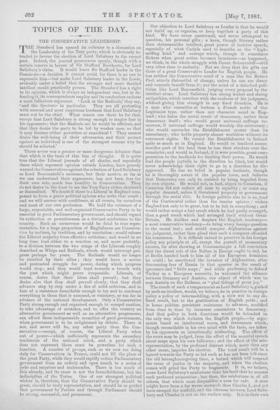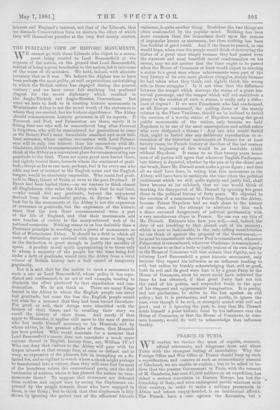TOPICS OF THE DAY.
THE CONSERVATIVE LEADERSHIP.
THE Standard has opened its columns to a discussion on • the Leadership of the Tory party, which is obviously in- tended to favour the election of Lord Salisbury to the vacant post. Indeed, the journal pronounces openly, though with a certain reserve in favour of Sir Stafford Northcote, for Lord Salisbury's claim. It would leave Sir Stafford leader in the Commons—a decision it cannot avoid, for there is no one to supersede him—but make Lord Salisbury leader in the Lords, evidently under a belief that the stronger and more decided intellect would practically govern, The Standard has a right to its opinion, which is always an independent one, but in de- fending it, its correspondents employ and its conductors endorse
a most fallacious argument. Look at the Radicals,' they say,
and the Spectator in particular. They are all protesting
with unusual.and most suspicious loudness that Lord Salisbury must not be the chief. What reason can there be for that, except that Lord Salisbury is strong enough to inspire fear in his opponents ; that the Radicals see he would be efficient, and that they desire the party to be led by weaker men, so that it may become either powerless or anarchical They cannot desire the well-being of their adversaries, and their protest against an individual is one of the strongest reasons why he should be selected.'
There never was a greater or more dangerous delusion than
that which is the basis of this line of thought. It is quite true that the Liberal journals of all shades, and especially those which represent opinion outside London, have gravely warned the Conservatives against the selection of Lord Salisbury as Lord Beaconsfield's successor, but their motive, so far as we can understand their arguments, has not been fear for their own side, much less hostility to Conservatism. They do not desire in the least to see the Tory Party either shattered or discredited. We doubt if there is a Liberal in England com- petent to form a grave polities,' opinion who seeks that result ; and we will answer with confidence, at all events, for ourselves and most of our own profession. We hold the existence of a large, respectable, and well-organised Conservative Party to be essential to good Parliamentary government, and should regard its extinction or powerlessness as a distinct misfortune to the country. Such an occurrence would be fatal to true repre- sentation, for a large proportion of Englishmen are Conserva- tive by instinct, by tradition, and by conviction ; would release the Liberal majority from effective criticism ; and would in no long time lead either to a reaction or, and more probably, to a division between the two wings of the Liberals roughly described as Whigs and Radicals, which would interrupt pro- gress perhaps for years. The Radicals would no longer be steadied by their allies ; they would have a severe and protracted struggle for power, during which progress would stop ; and they would tend towards a breach with the past which might prove irreparable. Liberals, of course, desire that their ideas shall prevail ; but they desire also that they shall prevail slowly, that they shall advance step by step under a fire of solid criticism, and in face of a resistance formidable enough to try and to condemn everything in them that is unsound, or visionary, or too far in advance of the national development. Only a Conservative Party strong enough and organised enough to compel caution, to take advantage of mistakes, and to offer the country an alternative government as well as an alternative programme, can afford these indispensable securities of good government, when government is to be enlightened by debate. There is not, and never will be, any other party than the Con- servative—except, of course, the Liberal Party when out of power—which sufficiently represents the secondary tendencies of the national mind, and a party which does not represent them must be powerless for such a function. A number of groups, such as we now see doing duty for Conservatives in France, could not fill the place of the great Party, while they would rapidly reduce Parliamentary government from an orderly and open march to a series of jerks and surprises and ambuscades. There is too much of this already, and its cause is not the formidableness, but the
indiscipline of the Tories. One of our strongest political wishes is, therefore, that the Conservative Party should be great, should be truly representative, and should be so guided that government by Parties and through Parliament should be strong, successful, and permanent.
Our objection to Lord Salisbury as Leader is that he would not build up, or organise, or keep together a party of this kind. We have never questioned, and never attempted to, question, his personal gifts ; a keen, though literary rather. than statesmanlike intellect, great power of incisive speech, especially of what Carlyle used to describe as the " high sniffing kind," and courage which, though it sometimes. flickers when great action becomes imminent—as happened,. we think, in the whole struggle with Count Schouvaloff—still. very often rises to audacity. But we deny that his gifts are those of a great Conservative Leader for English people, He has neither the Conservative mind of a man like Sir Robert Peel, utterly distrustful of change, unless he can see direct and concrete benefit`from it ; nor the mind of a detached poli- tician like Lord Beaconsfield, judging every proposal by the• intellect alone. Lord Salisbury has strong wishes and strong antipathies, which interfere with the coolness of his judgment,. without giving him strength in any fixed direction. He is a man who resembles at bottom a French noble of the Legitimist typo, rather than any character usual in Eng- land ; who hates the social result of democracy, rather than, democracy itself ; who would grant universal suffrage to- morrow, if universal suffrage would worship the aristocracy who would surrender the Establishment sooner than its. ascendancy; who holds property almost worthless without its extremest rights, He valued the Establishment in Ireland quite as much as in England. He would as landlord sooner sacrifice part of his land than be loss than absolute over the remainder, and would in Ireland, if it were possible, grant com- pensation to the landlords for limiting their power. He would lead the people joyfully in the direction he liked, but would. never acknowledge their right to go in a direction he dis- approved. lie has no belief in popular instincts, though he is thoroughly aware of the popular force, and believes. that Democracy can only be resisted by being beguiled from its own objects. He would not, in fact, object to Cresarism, if Cassarism did not reduce all men to equality ; or resist any popular demand, unless it threatened property or government through the social elite. In foreign politics also he is an fond' of the Continental rather than the insular opinion ;• wishes, England not only to be great, but to be felt in everything ; and would rather accept a bad result which he had partly arranged,, than a good result which had arranged itself without Great Britain, He dislikes and despises the English tendency--- a most conservative tendency—to bring every foreign question. to the moral test ; and would conquer Afghanistan against,. his judgment, rather than plead that such a conquest offended his conscience. It is difficult indeed to perceive in his foreign policy any principle at all, except the pursuit of momentary success, for after showing at Constantinople a full conviction. that the direct rule of the Sultan in Europe ought to end, he at Berlin handed back to him all of his European dominion, he could ; he sanctioned the invasion of Afghanistan, after denouncing fear of Russia in that quarter as the result of ignorance and " little maps ;" and while professing to defend Turkey as a European necessity, he welcomed the alliance, between Germany and Austria, one object of which • was to- seat Austria on the Balkans, as " glad tidings of great joy."
The result of such a temperament as. Lord Salisbury's, guided' by such an intellect, would, we believe, be in practice in foreign policy a policy of intermeddling, with a view not to any de- fined result, but to the gratification of English pride ; and. in home politics, persistent resistance to advance, modified. from time to time by immense concessions to democracy.. And that policy in both directions would be defended in the only way which irritates the English people,—by argu- merits based on intellectual scorn, and statements which,, though reconcilable in his own mind with the facts, are taken by his opponents as intentionally misleading. The effect of the scorn may be judged, from the effect of the scornful speech. about maps upon his own followers ; and the effect of the mis- representation, by the profound distrust which, more than any other cause, impedes his election. The total result will be a. hatred towards the Party so led such as has not been felt since the old boroughtnongering time, a hatred which will suspend the sense of justice in the majority, and when the election. comes will grind the Party to fragments. It is, we believe, more Lord Salisbury's misfortune than his fault that he arouses such profound animosities ; but then, the misfortune is, of all others, that which most disqualifies a man for rule. A man might have been a far worse monarch than Charles I., and yet have escaped the scaffold, and the likeness between Lord Salis- bury and Charles is not on the surface only. It is in their own
interest and England's interest, not that of the Liberals, that we dissuade Conservatives from an election the effect of which they will themselves perceive at the very first county contest.



































 Previous page
Previous page